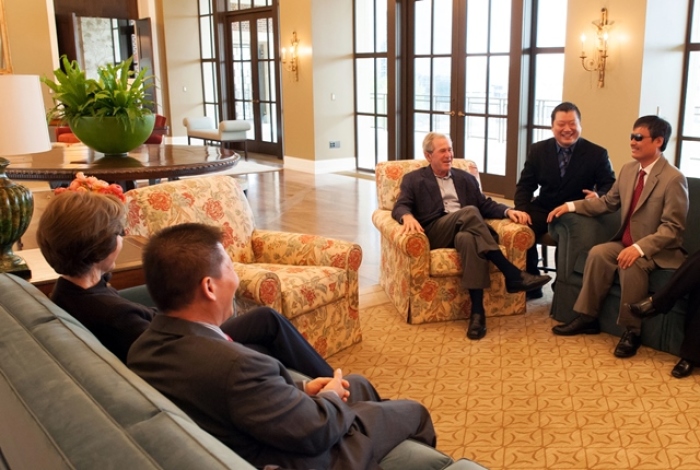Blind Activist Chen Guangcheng Says Chinese Must Fight for Democracy

Human rights activist Chen Guangcheng spoke about his continued fight for human rights and freedom in China during a half-hour live chat that was co-hosted by ChinaAid and the George W. Bush Institute on Wednesday.
Chen told Jim Glassman, founding executive director of the Bush Institute in Dallas, Texas, that "democracy doesn't drop out of the sky; people have to be willing to fight for it."
"For China to really change, there must be a grassroots movement to change the rule of law," Chen said, explaining that the Chinese people must continue to fight for their human rights. "No one is going to grant it out of mercy, because if they do, they can take it away from us as well. The burden is on us."
Chen emphasized that the Chinese people cannot expect outside forces to give them their rights. But he also noted there's a lot that Americans can do to promote democracy throughout the world.
"Today, in the information age, the world is getting smaller," he said, "so there's a lot the average American can do. Of course, it depends on people's specialties and callings. People can blog … there are a lot of things that people can do, no matter where you are."
"Any effort is not being wasted," he said, noting the Chinese Communist Party's censorship strategy is beginning to fail because people are able to obtain information, and they're willing to stand up and fight against the party's rule in China.
Chen said the Chinese have a clear understanding about human rights. But in order for the Chinese to open up to democracy, they must first understand it; and second, "they need to drop their fear and be willing to fight for it."
He also believes the U.S. government hasn't done enough to stop the Chinese Communist Party's human rights abuses against their people.
"The U.S. shouldn't compromise on human rights for the sake of commercial business," Chen said, reiterating his point that human rights isn't a small part of diplomacy, but that human rights is diplomacy.
Chen, 41, who's highly critical of China's one-child policy and the government's practices of forced sterilizations and abortions, was imprisoned for four years and then placed under house arrest for 19 months, when Christians and other activists helped him escape to seek refuge at the U.S. Embassy in Beijing. He was later granted a visa to the U.S., along with his wife and two children, in May 2012.
Regarding China's human rights violations, Chen believes that Communist Party leaders "never feel shame" about persecuting citizens and violating their human rights. Instead, "they feel proud of what they're doing," he said.
Glassman asked Chen if he believes China's president Xi Jinping is open to democracy, and if people are more hopeful about China's advances toward freedom under his leadership?
In Chen's opinion, the people are hopeful and have "over-expectations."
"He's really just changed seats," he said, "because he was part of the past leadership as well. The Chinese Communist Party wants to propagandize their system. Their focus is on retaining absolute power."
"In China, the government is a tool used by the Communist Party. The Communist Party authorities can do whatever they want – they are the highest authority, not the government," he said.
Chen's nephew, Chen Kegui, is currently being held in the same prison his uncle was at, and is serving out a three-year sentence after he was charged for assaulting a government official who broke into his family's home.
He said his nephew was threatened and severely beaten by police and local Communist Party leaders following his (Chen Guangcheng's) escape from house arrest last April. His nephew was told that even if he gets out of jail, he'll never see his family again. Communist Party leaders also told teachers to threaten his nephew's children at school, according to Chen, who said the Chinese government assured U.S. officials they would not prosecute his family. "But they're violating the agreement," he said.
Since his arrival to the U.S. almost one year ago, Chen said he's noticed many differences between the two countries, namely Americans' right to "freedom of speech, the right to vote for leaders, and the right to protest. These are impossible in China."
He also told Glassman that he's continuing to advocate for human rights while he lives in the U.S. to pursue his studies in English and law at New York University. And he's interested in learning more about the Declaration of Independence and the U.S. Constitution.
Chen added that he believes the democracy movement has already started in China, but that its success "depends on how much people want to fight for it."
For Americans who want to advocate for democracy, Chen said there's a lot that can be done over the Internet. He mentioned one thing people can do is to simply stay informed by reading Chinese news online using Google translate. And he noted the growing movement to bring awareness to this issue by visiting persecuted political prisoners.
In closing, Chen reiterated that he "hopes everybody around the world will fight for human rights and democracy." And he said that he'll "stand with everybody who's willing to fight for what already belongs to us."





























